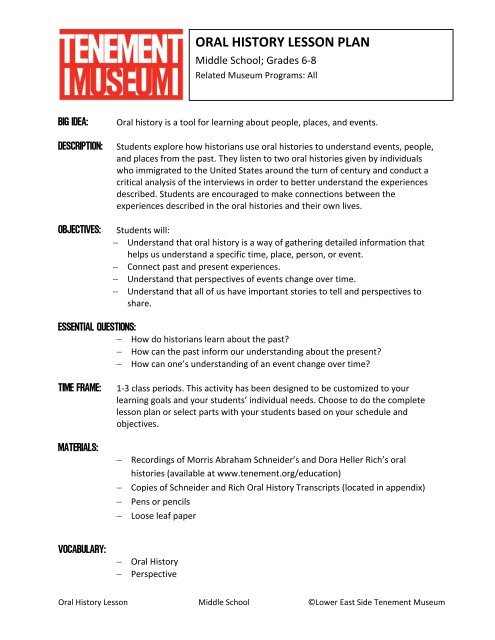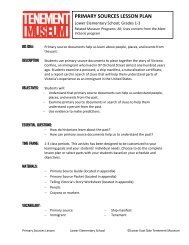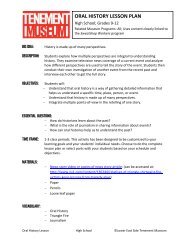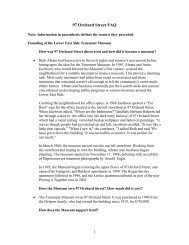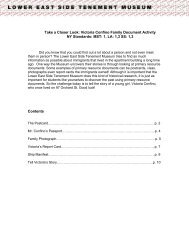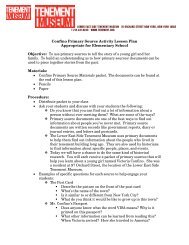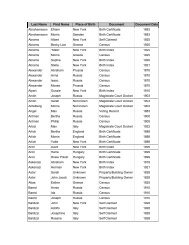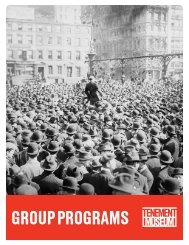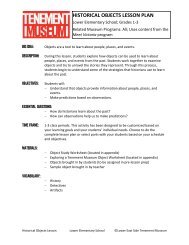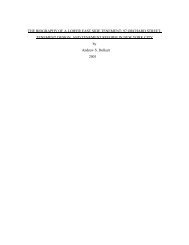ORAL HISTORY LESSON PLAN - Lower East Side Tenement Museum
ORAL HISTORY LESSON PLAN - Lower East Side Tenement Museum
ORAL HISTORY LESSON PLAN - Lower East Side Tenement Museum
You also want an ePaper? Increase the reach of your titles
YUMPU automatically turns print PDFs into web optimized ePapers that Google loves.
<strong>ORAL</strong> <strong>HISTORY</strong> <strong>LESSON</strong> <strong>PLAN</strong><br />
Middle School; Grades 6‐8<br />
Related <strong>Museum</strong> Programs: All<br />
Big Idea:<br />
Description:<br />
Objectives:<br />
Oral history is a tool for learning about people, places, and events.<br />
Students explore how historians use oral histories to understand events, people,<br />
and places from the past. They listen to two oral histories given by individuals<br />
who immigrated to the United States around the turn of century and conduct a<br />
critical analysis of the interviews in order to better understand the experiences<br />
described. Students are encouraged to make connections between the<br />
experiences described in the oral histories and their own lives.<br />
Students will:<br />
− Understand that oral history is a way of gathering detailed information that<br />
helps us understand a specific time, place, person, or event.<br />
− Connect past and present experiences.<br />
− Understand that perspectives of events change over time.<br />
− Understand that all of us have important stories to tell and perspectives to<br />
share.<br />
Essential Questions:<br />
− How do historians learn about the past<br />
− How can the past inform our understanding about the present<br />
− How can one’s understanding of an event change over time<br />
Time Frame:<br />
Materials:<br />
1‐3 class periods. This activity has been designed to be customized to your<br />
learning goals and your students’ individual needs. Choose to do the complete<br />
lesson plan or select parts with your students based on your schedule and<br />
objectives.<br />
− Recordings of Morris Abraham Schneider’s and Dora Heller Rich’s oral<br />
histories (available at www.tenement.org/education)<br />
− Copies of Schneider and Rich Oral History Transcripts (located in appendix)<br />
− Pens or pencils<br />
− Loose leaf paper<br />
Vocabulary:<br />
− Oral History<br />
− Perspective<br />
Oral History Lesson Middle School ©<strong>Lower</strong> <strong>East</strong> <strong>Side</strong> <strong>Tenement</strong> <strong>Museum</strong>
Procedure:<br />
Pre‐Lesson Prep (to be completed before the day of the lesson)<br />
− Watch the video and review the Triangle Factory Fire fact sheet to become familiar with<br />
the material used in this lesson.<br />
Part 1: Introduction<br />
− Ask students if they know any childhood stories about their parents or grandparents.<br />
− Instruct students to share those stories with someone sitting next to them.<br />
− Ask a few students to share their stories with the class.<br />
− Ask students how they know about those stories if they were not alive when those<br />
stories took place. Reinforce that information is often received through stories that<br />
people tell each other.<br />
− Connect the exercise to the work of historians. Explain to students that historians learn<br />
about the past by asking people to tell them stories about it. These stories are called<br />
oral history.<br />
Part 2: Activity<br />
− Tell students that in today’s lesson they will explore two different oral histories in order<br />
to learn what it was like for immigrant adolescents to become students in America.<br />
o The first oral history is from Morris Abraham Schneider, a man who emigrated<br />
from Poland in 1920 when he was 10 years old.<br />
o The second oral history is from Dora Heller Rich, a woman who emigrated from<br />
Austria in 1909 when she was 13 years old.<br />
− Distribute transcripts and play both recordings.<br />
− Ask students what they learned about Dora and Morris’s experiences at school when<br />
they first moved the United States.<br />
− Record students’ observations on the board. This is a good time to clarify some phrases<br />
and words from the oral histories. For example:<br />
o When Morris mentions he was put in 1A, he means he was put in a first grade<br />
class.<br />
o Yiddish is a language developed by European Jews over a century. It is primarily a<br />
combination of Hebrew and German.<br />
o The “reader” that Dora refers to would have been a sort of textbook.<br />
o “Julie” is German for July and “Junie” is German for June.<br />
− Play the recordings again and ask students to pay close attention to clues that help us<br />
understand how Dora and Morris felt about these initial experiences.<br />
− Collect and record students’ observations.<br />
Oral History Lesson Middle School ©<strong>Lower</strong> <strong>East</strong> <strong>Side</strong> <strong>Tenement</strong> <strong>Museum</strong>
− Reflect on Dora and Morris’ experience in school. Have students attribute adjectives to<br />
describe the feelings and emotions captured within the oral history. Guiding questions<br />
might include:<br />
o What do you think it would feel like to be placed in a first‐grade class at age 10<br />
How might that help us understand Morris’s experience<br />
o What do you think it would feel like to read in an unfamiliar language in front of<br />
your class How might that help us understand Dora’s experience<br />
o Dora laughed when she told the story about the students in her class laughing at<br />
her while she tried to read in English. If you were telling this story, would you<br />
have laughed Do we believe that she would have laughed while recounting this<br />
story on the day that it happened<br />
o Does anyone here have an embarrassing story from when they were younger<br />
How has your telling of that story changed over the years What does this tell us<br />
about how we should think about Morris’s and Dora’s stories—or stories like<br />
them Can we take them as absolute truth<br />
Part 3: Wrap‐Up<br />
− Instruct students to write a short paragraph reflecting on Dora and Morris’ school<br />
experience. In what ways were their experiences different from Dora and Morris’s In<br />
what ways were their experiences similar<br />
− Invite some students to share their thinking with the class.<br />
− Encourage students to think about Morris and Dora’s stories whenever they encounter<br />
students who are new to their school, sports team, or neighborhood.<br />
Assessment:<br />
− Review the students’ reflective writing.<br />
− Note what kind of details students were able to pull out from the oral histories. Did<br />
students pick up on how Morris and Dora might have felt<br />
− Note whether or not students were able to make personal connections to Morris and<br />
Dora’s stories.<br />
Extensions:<br />
− Have students interview a family member about their experiences when they were<br />
“new” in school and include that additional perspective in their essays.<br />
− Instruct students to write essays comparing their experiences with school to Morris and<br />
Dora’s experiences. Have students “publish” their work by revising, editing, and typing<br />
up their essays to create polished final drafts.<br />
− Facilitate a discussion about English as a Second Language (ESL) Education. First, read<br />
this article as a class: http://www.publicschoolreview.com/articles/95. Ask students<br />
how this debate relates to Morris’s and Dora’s stories. Ask students where they stand<br />
on the issue.<br />
− Meet the <strong>Tenement</strong> <strong>Museum</strong>’s oral historians and read an interview about their work<br />
on our blog: http://www.tenement.org/blog/p=193<br />
Oral History Lesson Middle School ©<strong>Lower</strong> <strong>East</strong> <strong>Side</strong> <strong>Tenement</strong> <strong>Museum</strong>
Appendix: Oral History transcripts<br />
Morris Abraham Schneider & Dora Heller Rich Oral History Excerpts<br />
Source: Ellis Island Oral History Project, National Parks Service<br />
Interviewer: Paul E. Sigrist Jr.<br />
Interview Dates: November 17, 1991 (Schneider) & August 9. 1991 (Rich)<br />
Morris Abraham Schneider<br />
Schneider: When we came we lived in Cherry Street just for about a half a year.<br />
And my first, when we came to Cherry Street, I started school two weeks after we<br />
came here. And not having any kind of schooling in Poland, I started‐‐I was ten<br />
years old and they put me into 1A. And I came and I was absolutely, no English,<br />
the only language I knew was Polish and Yiddish. And they put me, I was the<br />
oldest child in the class and, it was a large class, and the teacher told the class to<br />
stand up. I, not knowing any English, I didn't know what she was talking about<br />
and I was comfortable seated and I sat there. And she came over with a metal<br />
ruler and she whacked me across my arm. I don't think they could get away with<br />
it today but then they did. And she whacked me across my arm. I got up very<br />
quickly and I also realized that I had to learn English very quickly, too.<br />
Dora Heller Rich<br />
Rich: When I first got into class I could read but not English. I could read Polish<br />
and German. And the German is more or less the same lettering as the English, so<br />
my teacher said, "I want to hear what, how you can read in German." She give<br />
me the English reader and I begin reading and I read every word in German. I<br />
didn't, I remember only one word: in "July " I said "Julie", "Julie." And "June" and<br />
"Junie." And the kids were laughing, they were hysterical. (She laughs) How I<br />
pronounced the words. That's how she found out what I knew in reading. And I<br />
got to it; I got to it pretty soon. My parents were surprised. There was another<br />
girl and she also went to school. And my father showed her how I could read. So<br />
he took me in there. He says, "You read and let her read. Let's see who knows<br />
better." So I knew better and in no time, maybe a month, I read good. And it was<br />
an interesting time, what can I tell you<br />
Oral History Lesson Middle School ©<strong>Lower</strong> <strong>East</strong> <strong>Side</strong> <strong>Tenement</strong> <strong>Museum</strong>


